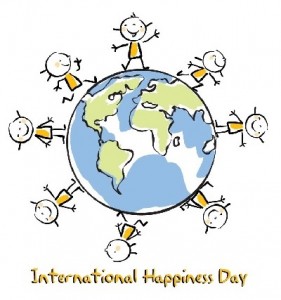A focus on happiness is always a great reminder to find the bright side in our lives and perhaps to lighten up a little. It can also provide us with an opportunity to be grateful for the blessings in our lives no matter how difficult life may be, and perhaps extend our focus to others who face more struggles than we do.
 International Day of Happiness celebrated on March 20, was declared by the United Nations to focus attention on people’s social and environmental wellbeing with the goal of improving conditions and alleviating poverty, opening the door to greater happiness. I think we all agree that it is vital to find ways to improve the physical conditions of our fellow human beings across the globe who live in poverty, but it also seems strange to me that this objective is presented in terms of happiness. We know by living in our first world society, that healthy and safe living conditions are not the whole story of happiness and contentment.
International Day of Happiness celebrated on March 20, was declared by the United Nations to focus attention on people’s social and environmental wellbeing with the goal of improving conditions and alleviating poverty, opening the door to greater happiness. I think we all agree that it is vital to find ways to improve the physical conditions of our fellow human beings across the globe who live in poverty, but it also seems strange to me that this objective is presented in terms of happiness. We know by living in our first world society, that healthy and safe living conditions are not the whole story of happiness and contentment.
The UN Secretary-General Ban Ki-moon qualifies happiness: “Happiness may have different meanings for different people. But we can all agree that it means working to end conflict, poverty and other unfortunate conditions in which so many of our fellow human beings live.” Yes, happiness is partly that, but not entirely. The definition would be more accurately reflected by happiness “… includes working to end conflict…” If this is the purpose of Happiness Day, why not call it what it is, such as “Fair For All Day” or Abolish Poverty Day, so that people are clearly focused on the real intention of the day.
I find it interesting that in present times, so much emphasis is placed on being positive and achieving happiness. Without a doubt it’s great to be positive, and we like to be in the happiness arena, but to place our thinking completely in the positive and happy zone is missing the mark. We are in danger of glossing over the real issues when we just focus on the happy side of things. At the personal, social and political levels, we know that we can easily avoid the murky waters by being upbeat and positive, and avoid feeling uncomfortable. How does the avoidance help the issue to become resolved and our struggle to be genuinely lifted? Is a focus on happiness really going to make inroads on the world’s poverty issues?
If we are real, we know that happiness is just one of our human states among many others. Surely it is unrealistic to single out one particular emotional state as the benchmark for our lives and the place that we should be setting our sights.
Undeniably, we all love to be happy or content, but can we really sustain a life of uninterrupted happiness and contentment? Is that really our human condition? Is that what life is all about anyway?
We know that even the most affluent have lives of immense struggle. Maintaining an air of happiness and promoting happiness for all as our human goal, borders on living in denial.
Our lives are in constant tension, for that is the very nature of life itself: the old giving way to the new; sadness arising from joy; trees transformed into houses; slaughtered animals becoming our food.
Designing programs for alleviating poverty is essential, and developing strategies for achieving happiness will undoubtedly help us in many ways, but I am certain there is no formula for eliminating struggle in our lives and replacing it with happiness, as the two are woven together. Paying attention to our struggle is just as important as appreciating the joy and happiness in our lives. Both are our blessings.
In the beautiful words of poet Kahlil Gibran:
“Your pain is the breaking of the shell that encloses your understanding. Even as the stone of the fruit must break, so that its heart may stand in the sun, so must you know pain. And could you keep your heart in wonder at all of the daily miracles in your life, your pain would not seem less wondrous than your joy; and you would accept the seasons of your heart, even as you have always accepted the seasons that pass over your fields.”Of course I would love to hear your views.
To keep up to date with Margaret’s articles and blogs, click HERE and enter your email address in the Subscribe section on the page, and click on the Go button. You will receive an email to confirm your subscription and you will need to click on the link in the email you receive in order to finalise your subscription.


Speak Your Mind